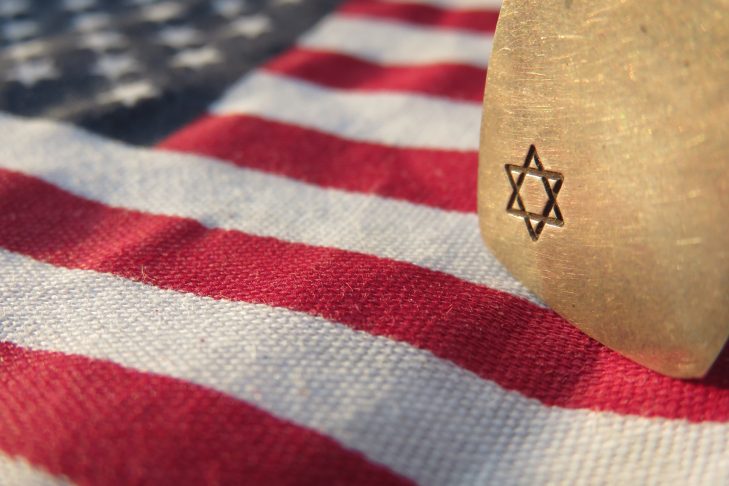This is us—American Jewry in the early 21st century—(mostly) divided, and yet in no way a monolith; we somehow stand as one people. According to the latest Pew Research Center survey of Jewish Americans in 2020—a prior version of the survey was rolled out in 2013—we embody myriad contradictions. Solicited through mail and online questionnaires from November 2019 to June 2020, the responses of 4,718 Jews across the country reveal more gradations than the 2013 findings. If this survey were a photograph, it would show gray on gray versus a black-and-white picture.
Statistics can be numbing and devoid of nuance. They can also confirm what we already know, but there can be conundrums too. The latest Pew findings show that most of us don’t strictly observe Jewish law. Yet we are devoted to our cultural Jewishness. We fry up latkes and go to seders; we just don’t set foot in a temple.
Our demographics are changing too. Nearly half of non-Orthodox Jews are married to a spouse who is not Jewish, which means we’re innovating how we “do Jewish.” Change is more urgent and inevitable given that the intermarriage number jumps to 61% for those who have married since 2010.
Related
Further observations of our population: 92% of us are non-Hispanic white. But the number skews higher when surveying Jews ages 18-29, 15% of whom identify as a race or ethnicity other than non-Hispanic white. To contextualize that number further, Pew reported that 17% of Jews surveyed lived in households where at least one child was Black, Hispanic, Asian or another non-white race or ethnicity, or multiracial.
How does our evolving diversity affect our religious observance? Again, calculating a number is tricky. Are we only focusing on the Jews in the pews, or do we also add those Jews who strongly identify culturally—Jews who attend seders, light a menorah or partake in Jewish foods? Then there is a distinctive group to parse—Jews who don’t traditionally observe but are nonetheless believers.
More statistics on being Jewish: A little over seven out of 10 American Jews consider memorializing the Holocaust and living a moral and ethical life essential to their Jewish identity. Just over half the Jews surveyed point out that social justice issues are important to them, as is intellectual curiosity and maintaining family traditions. The divide occurs when it comes to our approaches to halacha, or Jewish law. Only 15% of the respondents deem it critical to observe the fine points of Jewish law. Parsing that number further, 83% of Orthodox Jews say that following Jewish law is essential.
This brings us to a consideration of the major branches of Judaism. Outside of Jewish circles, I find it hard to explain how we, as one people, formally worship in different ways. Aren’t you all Jewish, people will commonly ask? Yes, but we are also a people with an uncanny ability to interpret, argue and, let’s face it, dig in our heels. The debates of Hillel and Shammai permeate our spiritual DNA. Simply put, we disagree a lot and will argue and argue “for the sake of heaven.”
On a related note, half of American Orthodox Jews say they either don’t have much in common with their Reform sisters and brothers, or there are no commonalities at all. Only 9% of Orthodox Jews feel they have a lot in common with Reform Jews. The feelings are reciprocal. But let’s put a pin in that and note the 2020 survey found that just over half of American Jewry belongs to the Reform and Conservative branches of Judaism. To further clarify, 37% identify as Reform and 17% as Conservative.
Within this flurry of statistics, 32% of American Jewish adults say they do not identify with any branch of Judaism or the Jewish religion itself. However, the vast majority of these people say they feel ethnically or culturally Jewish or have a Jewish parent. They may have been raised in a Jewish home. Yet when asked to state their current religion, they often describe themselves as atheist, agnostic or “nothing in particular.”
To round out the numbers, 9% of Jewish adults surveyed describe themselves as Orthodox, and 4% affiliate with other branches, such as Reconstructionist Judaism and Humanistic Judaism. The numbers account for 99% of American Jewry.
Another interesting finding: American Jews don’t see religion as important as Americans at large. Twenty-one percent of Jewish Americans versus 41% of the general American population say that religion is “very important to them.” The gap further widens when asked about believing in God. Around a quarter of American Jews say they believe in God as depicted in the Bible, while 56% of American adults say they do.
Pew researchers also found similar statistics when surveying political affiliations. It’s no surprise (and some might say comforting) that Jewish Americans are by and large liberal, with 71% of adults identifying as Democrats or independents who favor the Democratic Party. Notably, 75% of Orthodox Jews say they are Republicans or support the Republican Party. That is a significant (some might find shocking) upswing from the 2013 survey, which found that 57% of Orthodox Jews were Republican or Republican-friendly. Given that the survey was compiled in the run-up to the 2020 election, it’s understandable that American Jews are as divided about politics as the general population.
I’ve thrown a plethora of numbers (and some commentary) at you, so perhaps it’s easier to think of these statistics as a “paint by numbers” picture; what emerges is messy, maybe unexpected, and looks a little different to each person. Or perhaps I should borrow a standard Facebook relationship status and simply say, “It’s complicated”—as wonderfully, frustratingly and awesomely complicated as it has always been for us, the Jewish people, throughout the millennia.





